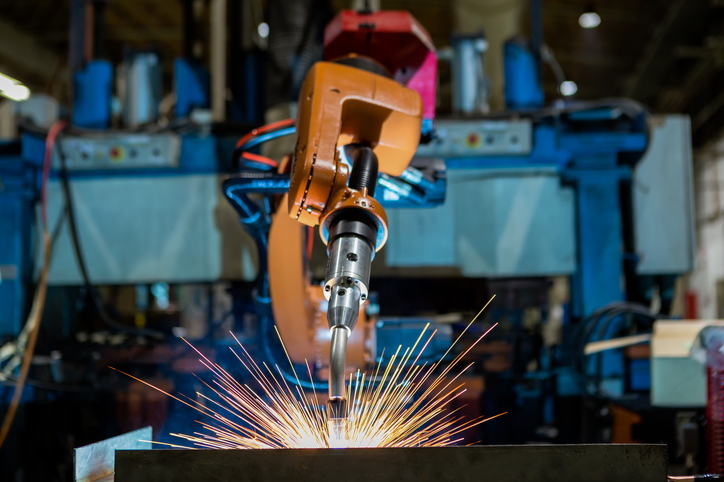In the metal fabrication industry, few metrics are more important than productivity and efficiency. Both are vital in facilitating production runs that are streamlined and cost-efficient, allowing businesses to get their products to market faster.
In the past, human fatigue, human error, and the inherent dangers of the manufacturing work environment placed heavy limitations on productivity. Manufacturers needed to balance worker safety with operational uptime.
Today, these factors are being mitigated by the increasing adoption of automation in the metal fabrication industry. With improvements in productivity and efficiency, automation is revolutionizing manufacturing for the better.
What is the Role of Automation in the Metal Fabrication Industry?
The metal fabrication industry has undergone a notable transformation in recent years thanks to automated systems and advancements. With a renewed focus on flow and sustainability, automation in metal fabrication helps streamline processes and cut back on un-planned downtime through:
- Lights-out manufacturing — Lights-out manufacturing enables metal fabricators to run production processes with little to no human involvement on the floor. So while the need for worker safety and rest remains intact, the manufacturing process can continue thanks to automated systems.
- Cutting-edge precision — Automated systems have significantly improved the precision of laser cutting operations. With advanced automation, laser cutters, waterjets, and plasma cutters can produce consistent, intricate designs that were once out of reach with manual methods.
- Machine tending — Loading raw materials, monitoring processes, and unloading finished products used to require direct human attention. Today, automated systems can handle machine tending so that human operators are freed up to focus on more complex tasks that require creativity and problem-solving.
- Post-production part handling — Before automation, human workers had to handle post-production tasks like part sorting, packaging, and basic quality control. Now automated systems can speed up post-production by managing these tasks without much oversight, ensuring that finished parts meet the highest quality standards.
The Technologies Driving Automation
When we talk about automation, it may seem like an abstract concept for most. The capabilities listed above are an obvious advantage, but what exactly goes into the systems that make all of that possible?
The first thing that might come to mind when automation is brought up are robots, and for good reason. Capable of consistently performing tasks that range from heavy lifting to intricate assembly, robots are the workhorses of metal fabrication automation. Cobots, or collaborative robots, are designed to work in close proximity to human operators, allowing for the co-existence of automation and human expertise on the floor.
While robots and cobots are ideal for repetitive tasks, machine learning and AI are critical when it comes to making continuous improvements to the metal fabrication industry. Similarly, the Internet of Things (IoT) binds automation technology together with sensors and devices that collect and transmit data for real-time insights into operational performance.
Together, these technologies make up the automated systems that are becoming integral in the metal fabrication industry.
How is Automation Changing the Metal Fabrication Industry?
Streamlined Processes
Automation streamlines the entire production process. From design to assembly, automated systems in metal fabrication reduce bottlenecks and enhance workflow efficiency. This is invaluable for industries like medical devices and homeland security, where fast reducing time to market and staying flexible to changing demands is essential.
Reduced Human Error
With human intervention minimized, automation also drastically reduces the occurrences of human error. This enables manufacturers to meet high demands without compromising on part quality. This is a huge benefit to a range of industries, including aerospace, where safety and aircraft performance rely on precisely manufactured complex components.
Enhanced Productivity
Continuous operation and minimized downtime through automation result in maximized productivity. Industries like telecom, which rely on the rapid production of customized designs, benefit from a manufacturer’s ability to meet these demands with precise, high-performance parts.
Improved Safety
The ability to assign the most dangerous tasks to robots and machines greatly enhances worker safety in manufacturing. Not only is this excellent news from a moral standpoint, but it also gives manufacturers the space to lower costs for customers.
Better Data and Feedback
Finally, automated systems can be set up to collect extensive data throughout the production process. This, in turn, provides manufacturers with the insights they need to further optimize processes and improve quality. With a continuous improvement mindset, this powerful capability will likely drive metal manufacturing to new levels of innovation.
Advantage Metal Products Streamlines with Automation
At Advantage Metal Products, we have over 30 years of experience in the metal fabrication industry. And while a lot has changed in manufacturing in that time, the core of our mission has always been the same: to deliver the most advanced, innovative manufacturing services to customers across a range of industries.
From engineer support and manufacturing to assembly and project management, we aim to be a one-stop-shop for all your metal components needs. Our U.S.-based manufacturing facility in Livermore, CA is equipped with the latest in automation technologies and systems, so we can streamline your production, produce high-quality complex parts, and help you get your product to market faster.
Looking to partner with a contract manufacturer that can harness the power of automation for your next production run? Connect with us today to get started.



